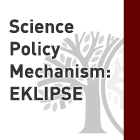ALTER-Net conference: Full recommendations now available
We anticipate that these recommendations from the conference will further facilitate science-policy interaction on the EU 2020 Biodiversity Strategy, and motivate scientists to make implementation and realization of the EU's policy goals the subject of their research. The recommendations will be presented at the EPBRS meeting in Dublin next month.
Six headline recommendations were chosen, one per target. They are:
EU-target 1: Natura 2000 success depends primarily on ecosystem health, together with genetic health of its species and populations, rather than on present-day distribution patterns of specific species and habitats; in the end, ecosystem health and genetic population health are important for human well-being in general.
EU-target 2: Mapping ecosystems and valuing their services is seen as important for improving the knowledge base about nature and social-ecological systems, but to avoid true merchandising of biodiversity, the use of monetary valuation and economic instruments should be limited to areas and situations where the monetary information is necessary for triggering conservation behaviour.
EU-target 3: Knowing which problems need standard approaches and which need targeted policy instruments is vital for the development and application of effective biodiversity conservation on managed lands. To advance sustainable agriculture and forestry, engaging the sector actors should be supplemented with standard best practices to solve well-understood general problems as well as innovative and diversified solutions to solve specific and geographically-limited problems. Research should support also the monitoring and evaluation of these different types of problems and solutions.
EU-target 4: Science is the engine to generate adaptive management tools to optimise sustainable fisheries; rather than management based on a single species (among which the present-day minimum size approach for harvesting), ecosystem-based fisheries management should be generally implemented.
EU-target 5: Policy should aim at the broad impact of Invasive Alien Species and their interaction with native biodiversity, health and food production rather than on the sole fact of being alien as criterion for combating details: the first short-term challenge is to develop legal and economic instruments, which are currently being worked on by the policy-makers. The second challenge is to fill in the legal instruments with help of combined scientific efforts when it comes to integrating and linking different databases, web portals and other data collections.
EU-target 6: The price of food, fibre and water should encompass both the production and maintenance cost of the ecosystem.
More information
- Recommendations from the conference.
- The ALTER-Net conference was co-organised with the European Commission and took place in Ghent, Belgium from 15-18 April 2013. The local organiser was ALTER-Net partner member INBO. The conference was attended by over 200 scientists, policy-makers (including representatives from the EC's Directorate-General for Environment) and others.
- Information about the EU Biodiversity Targets can be found here.







